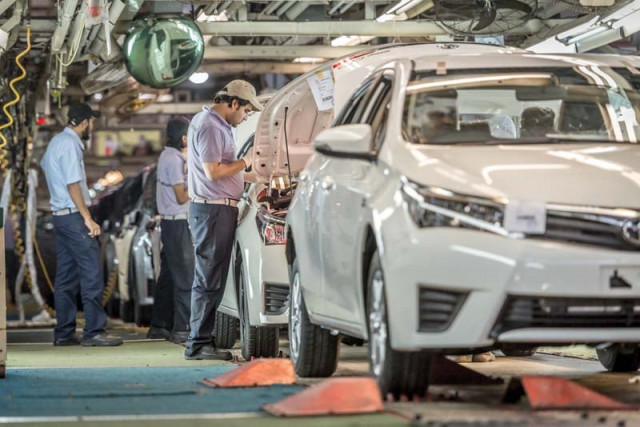Indus Motor temporarily shuts plant
Company says closure from Feb 1 - 14 is due to inventory shortages

The Indus Motor Company (IMC) Limited, assembler and seller of Toyota vehicles in Pakistan, will temporarily shut down its plant, from February 1 to February 14, on grounds of inventory shortage, the company said in a statement.
In a notice filed to the Pakistan Stock Exchange (PSX) on Tuesday, the company highlighted that the lack of raw material and difficulty in receiving clearance from commercial banks have adversely affected the production and delivery of vehicles, leading to a temporary halt in the company’s operations.
As per details, company will restart production on February 15, but it will only be operating on a single-shift basis until further notice, as the company and their vendors are facing major challenges in importing raw material and receiving clearance from commercial banks.
The company, however, hopes to resume full operations once the situation improves.
This shutdown will impact the company’s production and delivery of vehicles.
“In light of the recently introduced mechanism vide EPD Circular No 20 of 2022, effective from January 2, 2023, commercial banks are advised to prioritise and facilitate the imports to specified sectors only, which does not include the auto sector,” said the company’s notice.
This shutdown is a result of the ongoing challenges faced by the auto industry in Pakistan.
According to auto expert Sabir Shaikh, “The recent devaluation of the rupee has further exacerbated the situation for the auto sector.”
Bookings of Suzuki bikes are still suspended due to the devaluation of the rupee, making it impossible to determine the exact cost of products.
“The automobile sector in Pakistan has been hit hard by the persistent decline in vehicle sales, resulting in a staggering 250,000 to 300,000 workers losing their jobs,” said Mashood Ali Khan, an exporter of auto parts.
“This dire situation has not only impacted the workers but has also caused concern among industry leaders and policymakers.”
He attributed the job losses to economic uncertainty and the decline in vehicle sales. He believed that the current crisis can only be mitigated by controlling overhead expenses and the rising cost of raw materials.
He further stressed the need for a National Economic Development Plan that could provide a roadmap for the industry and help in the creation of new jobs.
“In order to tackle the challenges faced by the auto sector, there is a pressing need for a concerted effort to be made by all stakeholders, including political parties and industrialists,” he said, adding that, “The government must take a lead in this regard by formulating policies that are geared towards promoting the growth of the automobile industry.”
This can be achieved by providing tax incentives and subsidies to the industry, reducing the cost of inputs, and creating a level playing field for domestic producers, he suggested.
Published in The Express Tribune, February 1st, 2023.
Like Business on Facebook, follow @TribuneBiz on Twitter to stay informed and join in the conversation.



















COMMENTS
Comments are moderated and generally will be posted if they are on-topic and not abusive.
For more information, please see our Comments FAQ